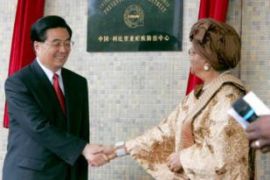Zambia cancels Hu mine visit
Scheduled trip by Chinese president to scene of 2005 blast called off by officials.

More than 2,000 miners at Chambeshi have complained that the Chinese management have paid low wages and failed to adhere to safety measures.
There has been wider anti-Chinese sentiment across Zambia ahead of Hu’s visit, with many accusing Chinese firms of exploiting local labourers, work standards and the country’s mineral wealth.
On Thursday, the Zambian government said that Hu’s trip to the Copperbelt and Southern provinces in Zambia had been cancelled, but did not give any reasons.
Movement restricted
Emmanuel Nyirenda, information ministry secretary, said that Hu’s movements would be restricted to Lusaka.
He was scheduled to commission a $200m copper smelter at the Chambeshi mine.
He was also due to go to Ndola, a town in Zambia‘s Copperbelt province where he was expected to lay the foundation stone of a Chinese-funded stadium.
Hu’s tour of eight nations in Africa is part of a drive to deepen Chinese ties on the continent.
He arrives in Zambia from Sudan and will leave Lusaka for Namibia.
Liberia visit
Earlier on Friday, he met Ellen Johnson-Sirleaf, Liberia’s president, on the second leg of the tour.
Thousands of people waving flags lined the road from the airport into the capital where Hu and Sirleaf held talks and signed a series of accords. The Chinese president also announced he was cancelling the West African country’s $15m debt.
Sirleaf expressed hope that Hu’s visit would bring greater development opportunities to Liberia.
“Our country is rich in natural resources and we want to put our population and our young people to work,” she said.
Official Chinese figures show that Sino-African trade reached $55.5bn last year, compared to $10.8bn in 2001.
Wen Jiabao, China’s premier, said last year he hoped Sino-African trade would reach $100bn by 2010.